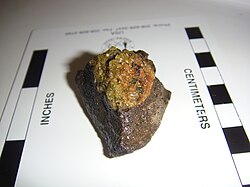| Igneous rock | |
 Olivine weathering to iddingsite | |
| Composition | |
|---|---|
| Olivine, clays, ferrihydrites |
Iddingsite is a microcrystalline rock that is derived from alteration of olivine. It is usually studied as a mineral, and consists of a mixture of remnant olivine, clay minerals, iron oxides, and ferrihydrites. Debates over iddingsite's non-definite crystal structure caused it to be de-listed as an official mineral by the IMA; thus, it is properly referred to as a rock.
Iddingsite forms from the weathering of basalt in the presence of liquid water and can be described[by whom?] as a phenocryst, i.e. it has macroscopically visible crystals in a fine-grained groundmass of a porphyritic rock. It is a pseudomorph that has a composition that is constantly transforming from the original olivine, passing through many stages of structural and chemical change to create a fully altered iddingsite.
Because iddingsite is constantly transforming it does not have a definite structure or a definite chemical composition. The chemical formula for iddingsite has been approximated as MgO * Fe2O3 * 3SiO2 * 4 H2O [1] where MgO can be substituted by CaO. The geologic occurrence of iddingsite is limited to extrusive or subvolcanic rocks that are formed by injection of magma near the surface. It is absent from deep-seated rocks and is found on meteorites. As it has been found on Martian meteorites, its ages have been calculated to obtain absolute ages when liquid water was at or near the surface of Mars.
It was named after Joseph P. Iddings, an American petrologist. [1]
- ^ a b Iddingsite, Mindat.org, retrieved March 25, 2019